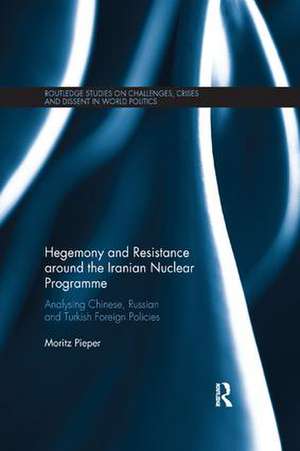Hegemony and Resistance around the Iranian Nuclear Programme: Analysing Chinese, Russian and Turkish Foreign Policies: Routledge Studies on Challenges, Crises and Dissent in World Politics
Autor Moritz Pieperen Limba Engleză Paperback – 17 ian 2019
This book is the first to provide comprehensive and comparative analyses to conceptualise the interaction between ‘hegemonic structures’ and those actors resisting them using the Iranian nuclear case as an illustration. It analyses the foreign policies of China, Russia and Turkey towards the Iranian nuclear programme and thereby answers the question to what extent these policies are indicative of a security culture that resists hegemony. Based on 70 elite interviews with experts and decision-makers closely involved with the Iranian nuclear file, it analyses resistance to hegemony across its ideational, material and institutional framework conditions. The cases examined show how ‘compliance’ on the part of China, Russia and Turkey with parts of US approaches to the Iranian nuclear conflict has been selective, and how US policy preferences in the Iran dossier have been resisted on other occasions. As such, the Iran nuclear case serves as an illustration to shed light on the contemporaneous interaction of the forces of consent and coercion in international politics.
This book will be of key interest to scholars, students and practitioners in International Relations, Security Studies and Foreign Policy Analysis.
| Toate formatele și edițiile | Preț | Express |
|---|---|---|
| Paperback (1) | 408.54 lei 43-57 zile | |
| Taylor & Francis – 17 ian 2019 | 408.54 lei 43-57 zile | |
| Hardback (1) | 999.46 lei 43-57 zile | |
| Taylor & Francis – 19 apr 2017 | 999.46 lei 43-57 zile |
Preț: 408.54 lei
Nou
Puncte Express: 613
Preț estimativ în valută:
78.20€ • 84.97$ • 65.73£
78.20€ • 84.97$ • 65.73£
Carte tipărită la comandă
Livrare economică 21 aprilie-05 mai
Preluare comenzi: 021 569.72.76
Specificații
ISBN-13: 9780367173807
ISBN-10: 0367173808
Pagini: 190
Dimensiuni: 156 x 234 x 10 mm
Greutate: 0.27 kg
Ediția:1
Editura: Taylor & Francis
Colecția Routledge
Seria Routledge Studies on Challenges, Crises and Dissent in World Politics
Locul publicării:Oxford, United Kingdom
ISBN-10: 0367173808
Pagini: 190
Dimensiuni: 156 x 234 x 10 mm
Greutate: 0.27 kg
Ediția:1
Editura: Taylor & Francis
Colecția Routledge
Seria Routledge Studies on Challenges, Crises and Dissent in World Politics
Locul publicării:Oxford, United Kingdom
Public țintă
Postgraduate and UndergraduateCuprins
Introduction
1. Security Discourse on Iran: The Power to Construct International Relation
2. Turkish Foreign Policy towards the Iranian Nuclear Programme
3. Russian Foreign Policy towards the Iranian nuclear programme
4. Chinese foreign policy towards the Iranian nuclear programme
5. Chinese, Russian and Turkish Policies in the Iranian Nuclear Dossier
6. Conclusion: The ‘Iran Question’ and Dissent in World Order
1. Security Discourse on Iran: The Power to Construct International Relation
2. Turkish Foreign Policy towards the Iranian Nuclear Programme
3. Russian Foreign Policy towards the Iranian nuclear programme
4. Chinese foreign policy towards the Iranian nuclear programme
5. Chinese, Russian and Turkish Policies in the Iranian Nuclear Dossier
6. Conclusion: The ‘Iran Question’ and Dissent in World Order
Notă biografică
Moritz Pieper is Lecturer in International Relations at the University of Salford, UK. He has been a visiting Research Fellow at China Foreign Affairs University (CFAU), Beijing, the German Institute for International and Security Affairs, Brussels, and at the School of Oriental and African Studies (SOAS), London.
Descriere
This book is the first to provide comprehensive and comparative analyses to conceptualise the interaction between ‘hegemonic structures’ and those actors resisting them using the Iranian nuclear case as an illustration. It analyses the foreign policies of China, Russia and Turkey towards the Iranian nuclear programme and thereby answers the question to what extent these policies are indicative of a security culture that resists hegemony. Based on 70 elite interviews with experts and decision-makers closely involved with the Iranian nuclear file, it analyses resistance to hegemony across its ideational, material and institutional framework conditions.













